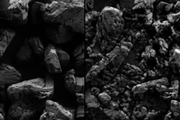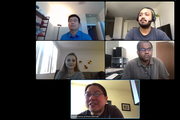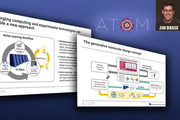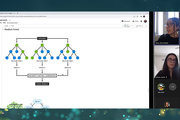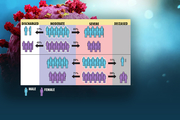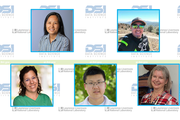Did you know we have a monthly newsletter? View past volumes and subscribe.
Welcome new DSI team members
April 2, 2024 -
When Data Science Institute (DSI) director Brian Giera and deputy director Cindy Gonzales began planning activities for fiscal year 2024 and beyond, they immediately realized that LLNL’s growth in data science and artificial intelligence (AI)/machine learning (ML) research requires corresponding growth in the DSI’s efforts. “Our field is booming,” Giera states. “The Lab has a stake in the...
LLNL’s Kailkhura elevated to IEEE senior member
Nov. 8, 2023 -
IEEE, the world’s largest technical professional organization, has elevated LLNL research staff member Bhavya Kailkhura to the grade of senior member within the organization. IEEE has more than 427,000 members in more than 190 countries, including engineers, scientists and allied professionals in the electrical and computer sciences, engineering and related disciplines. Just 10% of IEEE’s...
Explainable artificial intelligence can enhance scientific workflows
July 25, 2023 -
As ML and AI tools become more widespread, a team of researchers in LLNL’s Computing and Physical and Life Sciences directorates are trying to provide a reasonable starting place for scientists who want to apply ML/AI, but don’t have the appropriate background. The team’s work grew out of a Laboratory Directed Research and Development project on feedstock materials optimization, which led to...
Cognitive simulation supercharges scientific research
Jan. 10, 2023 -
Computer modeling has been essential to scientific research for more than half a century—since the advent of computers sufficiently powerful to handle modeling’s computational load. Models simulate natural phenomena to aid scientists in understanding their underlying principles. Yet, while the most complex models running on supercomputers may contain millions of lines of code and generate...
LLNL researchers win HPCwire award for applying cognitive simulation to ICF
Nov. 17, 2022 -
The high performance computing publication HPCwire announced LLNL as the winner of its Editor’s Choice award for Best Use of HPC in Energy for applying cognitive simulation (CogSim) methods to inertial confinement fusion (ICF) research. The award was presented at the largest supercomputing conference in the world: the 2022 International Conference for High Performance Computing, Networking...
Panel discussion spotlights COVID-19 R&D
July 19, 2022 -
The DSI’s career panel series continued on June 28 to highlight some of LLNL’s COVID-19 research projects. Three data scientists—Emilia Grzesiak, Derek Jones, and Priyadip Ray—joined moderator and data scientist Stewart He to talk about their work in drug screening, protein–drug compounds, antibody–antigen sequence analysis, and risk factor identification.
He, who earned a PhD in Computer...
UC Merced students work with LLNL mentors on potential new drugs to combat COVID-19
June 30, 2022 -
Students from the University of California, Merced worked with mentors at LLNL to identify drug compounds that could be used to treat COVID-19 during a two-week Data Science Challenge (DSC) that concluded on June 6. For the first time in the DSC series since the COVID-19 pandemic began in 2020, Lab mentors visited the college campus to provide in-person guidance for five teams of UC Merced...
Assured and robust…or bust
June 30, 2022 -
The consequences of a machine learning (ML) error that presents irrelevant advertisements to a group of social media users may seem relatively minor. However, this opacity, combined with the fact that ML systems are nascent and imperfect, makes trusting their accuracy difficult in mission-critical situations, such as recognizing life-or-death risks to military personnel or advancing materials...
LLNL’s Brase discusses advances by ATOM in accelerating drug discovery pipeline
June 7, 2022 -
The private-public Accelerating Therapeutic Opportunities in Medicine (ATOM) consortium is showing “significant” progress in demonstrating that HPC and M) tools can speed up the drug discovery process, said Jim Brase, ATOM co-lead and LLNL’s deputy associate director for data science. The consortium currently boasts more than a dozen member organizations, including national laboratories...
CASC team wins best paper at visualization symposium
May 25, 2022 -
A research team from LLNL’s Center for Applied Scientific Computing won Best Paper at the 15th IEEE Pacific Visualization Symposium (PacificVis), which was held virtually on April 11–14. Computer scientists Harsh Bhatia, Peer-Timo Bremer, and Peter Lindstrom collaborated with University of Utah colleagues Duong Hoang, Nate Morrical, and Valerio Pascucci on “AMM: Adaptive Multilinear Meshes.”...
Kevin McLoughlin applies computational biology to complex problems
May 17, 2022 -
Kevin McLoughlin has always been fascinated by the intersection of computing and biology. His LLNL career encompasses award-winning microbial detection technology, a COVID-19 antiviral drug design pipeline, and work with the ATOM consortium. The appeal for him in these projects lies at the intersection of computing and biology. “I love finding ways to visualize data that reveal relationships...
Accelerating the path to precision medicine
March 22, 2022 -
LLNL joined the Transforming Research and Clinical Knowledge in Traumatic Brain Injury (TRACK-TBI) consortium in 2018. The national, multiyear, multidisciplinary effort, led by the University of California at San Francisco in collaboration with Lawrence Berkeley and Argonne national laboratories and other leading research organizations and universities, combines neuroimaging, blood-based...
Machine learning model finds COVID-19 risks for cancer patients
March 10, 2022 -
A new study by researchers at LLNL and the University of California, San Francisco, looks to identify cancer-related risks for poor outcomes from COVID-19. Analyzing one of the largest databases of patients with cancer and COVID-19, the team found previously unreported links between a rare type of cancer—as well as two cancer treatment-related drugs—and an increased risk of hospitalization...
Winter hackathon meets WiDS datathon
March 9, 2022 -
Sponsored by the DSI, LLNL’s winter hackathon took place on February 16–17. Hackathons are 24-hour events that encourage collaborative programming and creative problem solving. In addition to traditional hacking, the hackathon included a special datathon competition in anticipation of the Women in Data Science (WiDS) conference on March 7. Hackathon and datathon participants presented their...
LLNL team models COVID-19 disease progression and identifies risk factors
Feb. 15, 2022 -
An LLNL team has developed a comprehensive dynamic model of COVID-19 disease progression in hospitalized patients, finding that risk factors for complications from the disease are dependent on the patient’s disease state. Using a machine learning algorithm on a dataset of electronic health records from more than 1,300 hospitalized COVID-19 patients with ProMedica — the largest health care...
COVID-19 R&D: Computing responds to pandemic
Jan. 19, 2022 -
When the COVID-19 pandemic began, the Laboratory immediately started seeking solutions to the myriad challenges posed by the global crisis. The Computing Directorate jumped right in with research and development activities that combine molecular screening to inform antiviral drug experimentation; a generative molecular design software platform to optimize properties of antiviral drugs; an...
Unprecedented multiscale model of protein behavior linked to cancer-causing mutations
Jan. 10, 2022 -
LLNL researchers and a multi-institutional team have developed a highly detailed, machine learning–backed multiscale model revealing the importance of lipids to the signaling dynamics of RAS, a family of proteins whose mutations are linked to numerous cancers. Published by the Proceedings of the National Academy of Sciences, the paper details the methodology behind the Multiscale Machine...
LLNL establishes AI Innovation Incubator to advance artificial intelligence for applied science
Dec. 20, 2021 -
LLNL has established the AI Innovation Incubator (AI3), a collaborative hub aimed at uniting experts in artificial intelligence (AI) from LLNL, industry and academia to advance AI for large-scale scientific and commercial applications. LLNL has entered into a new memoranda of understanding with Google, IBM and NVIDIA, with plans to use the incubator to facilitate discussions and form future...
Career panel spotlights diversity, equity, and inclusion
Nov. 19, 2021 -
The DSI’s career panel series continued on November 3 with a session highlighting diversity, equity, and inclusion (DEI) as well as the Lab’s DEI-focused employee resource groups (ERGs). ERGs are sponsored by LLNL’s Office of Strategic Diversity and Inclusion Programs.
Moderator Anh Quach, member of the Asian Pacific American Council (APAC), was joined by four panelists: Raul Viera Mercado...
Building confidence in materials modeling using statistics
Oct. 31, 2021 -
LLNL statisticians, computational modelers, and materials scientists have been developing a statistical framework for researchers to better assess the relationship between model uncertainties and experimental data. The Livermore-developed statistical framework is intended to assess sources of uncertainty in strength model input, recommend new experiments to reduce those sources of uncertainty...



